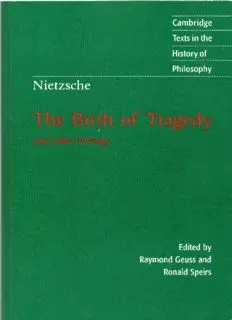
The Birth of Tragedy and Other Writings PDF
Preview The Birth of Tragedy and Other Writings
CAMBRIDGE TEXTS IN THE HISTORY OF PHILOSOPHY FRIEDRICH NIETZSCHE The Birth ofTragedy CAMBRIDGE TEXTS IN THE HISTORY OF PHILOSOPHY Serieseditors KARL AMERIKS ProfessorofPhilosophyattheUniversityofNotreDame DESMOND M. CLARKE ProfessorofPhilosophyatUniversityCollegeCork ThemainobjectiveofCambridgeTextsintheHistoryofPhilosophyistoexpandtherange, varietyandqualityoftextsinthehistoryofphilosophywhichareavailableinEnglish.The series includes texts by familiar names (such as Descartes and Kant) and also by less well-knownauthors. Whereverpossible,textsarepublishedincompleteandunabridged form, andtranslationsarespeciallycommissionedfortheseries.Eachvolumecontainsa criticalintroductiontogetherwithaguidetofurtherreadingandanynecessaryglossaries and textualapparatus. Thevolumesaredesigned for studentuseatundergraduateand postgraduatelevelandwillbeofinterestnotonlytostudentsofphilosophy,butalsotoa wideraudienceofreadersinthehistoryofscience,thehistoryoftheologyandthehistory ofideas. Foralistoftitlespublishedintheseries,pleaseseeendofbook. FRIEDRICH NIETZSCHE The Birth ofTragedy and Other Writings EDITED BY RAYMOND GEUSS UniversityofCambridge AND RONALD SPEIRS UniversityofBirmingham TRANSLATED BY RONALD SPEIRS 11111~11111 CAMBRIDGE . ;:; UNIVERSITY PRESS CAMBRIDGEUNIVERSITYPRESS Cambridge,NewYork,Melbourne,Madrid,CapeTown,Singapore,S"aoPaulo CambridgeUniversityPress TheEdinburghBuilding,CambridgeCB22RU,UK PublishedintheUnitedStatesofAmericabyCambridgeUniversityPress,NewYork www.cambridge.org Informationonthistitle:www.cambridge.org/9780521639873 ©CambridgeUniversityPress1999 Thispublicationisincopyright.Subjecttostatutoryexception andtotheprovisionsofrelevantcollectivelicensingagreements, noreproductionofanypartmaytakeplacewithout thewrittenpermissionofCambridgeUniversityPress. Firstpublished1999 Ninthprinting2007 PrintedintheUnitedKindomattheUniversityPress,Cambridge Acataloguerecord.forthispublicationisavailablefromtheBritishLibrary LibraryofCongresscataloguinginpublicationdata Nietzsche,FriedrichWilhelm,1844-1900. [Selections.English.1999] Thebirthoftragedyandotherwritings/ FriedrichNietzsche; editedbyRaymondGeussandRonaldSpeirs;translatedbyRonaldSpeirs. p. cm.- (Cambridgetextsinthehistoryofphilosophy) Includesbibliographicalreferencesandindex. ISBN0521630169(hardback).- ISBN0521639875(pbk.) I.Philosophy,Modern.I.Geuss,Raymond.II.Speirs,Ronald. III.Title.IV.Series. B3312.E5G481999 193-dC21 98-35097CIP ISBN 978-0-521-63016-0 hardback ISBN 978-0-521-63987-3 paperback CambridgeUniversityPresshasnoresponsiblityforthepersistenceoraccuracy ofURLsforexternalorthird-partyinternetwebsitesreferredtointhispublication, anddoesnotguaranteethatanycontentonsuchwebsitesis,orwillremain, accurateorappropriate. Contents Introduction page vii Chronology XXXI Furtherreading XXXIV Note onthetext XXXVll TheBirthofTragedy 1 TheDionysiacWorldView 117 OnTruthandLyinginaNon-MoralSense 139 Glossary 154 Index 157 v Introduction CosimaWagner'sthirty-thirdbirthday,herfirstsincesheandWagnerhad married,fellon25December1870.Wagner'spresenttoherwasthenewly composed'SiegfriedIdyll'.Hesecretlyarrangedforasmallgroupofmusi cians to assemble in the morningon the stairs outside her bedroom and they began to playas she awoke. One ofthe guests present at this per formance was the newly appointed 26-year-old Professor of Classical Philologyat the UniversityofBasle, Friedrich Nietzsche. Nietzsche was an ardent admirer ofWagner's music, and he and Wagner shared an en thusiasm for the philosophical pessimismofArthur Schopenhauer. The worldasweknowit,Schopenhauerthought,theworldofobjectsinspace and time heldtogetherbyrelationsofcauseandeffect, wasnothingbuta representation, an illusion generated by the unending play ofa meta physical entity which he called 'the Will'. This Will, the underlying reality ofthe world, expressed itselfin a variety ofways in the human world, mostkeenly in the form ofsexual desire; it had each human indi vidualinitsgripanddroveeachofusontoformsofactionthatinevitably ended either in disgustingsatiationor in frustration. The very nature of theuniverseprecludedthepossibilityofanycontinuinghumanhappiness. Thebestwecouldhopefor, Schopenhauerargued,wasmomentaryrespite from the continual flux ofwilling and frustration through the contem plation ofart. Aesthetic experience could have this effect because it is radically disinterested and thus extracts us from the world ofwilling. Music,inparticular,isinherentlynon-representational,andSchopenhauer draws from this fact the stunning conclusion that music both gives us virtually directaccess to ultimate reality, and is also one ofthe bestways availabletousofdistancingourselvesfromtherelentlessthroboftheWill. Vll Introduction Thisheadycombinationofextremepessimism,sexualfantasypresented as metaphysics and the deification ofmusic was irresistible to Wagner, the unemployed kapellmeister who had spentadecade ofhis life in exile following his participation in the failed revolution of1849 and who had experienced some difficulty in controlling the attractions the wives of variousofhispatronsandassociatesheldforhim.Hewasdelightedtofind ayoungacademicwhosharedsomanyofhisownpassionateinterestsand NietzschebecameafrequentvisitoratWagner'shouseinTribschen,near Lucerne,andanintimatefriendofthefamily. OnthatChristmasmorning he, too, had apresentfor Cosima, the manuscriptofastudyentitled 'Die Entstehung des tragischen Gedankens'. In turn he received a copy of Wagner'srecentessay'Beethoven'andapianoreductionofthefirstactof Siegfried. In the evening there were two further performances of the 'SiegfriedIdyll',andWagnerreadaloudfromthetextofDieMeistersinger. The next day Nietzsche's manuscript was read aloud and discussed. On 1January 1871 Nietzsche returned to Basle and began work on his first book, The Birth ofTragedy out ofthe Spirit ofMusic, using some ofthe material he had originally elaborated in Cosima's birthday present. He dedicatedthebooktoWagner. By1886,whenhewaspreparingasecondeditionofthework,Nietzsche claimed to have long since changed his mind about Wagner (and about Schopenhauer).Ashewouldlaterputit,hehadeventuallyovercomethese two youthful enthusiasms, exchanging Schopenhauerian pessimism for a fully affirmative attitude towards life and coming to see Wagner as a decadent and the embodiment ofeverything that was to be rejected in modern culture. So the view has sometimes been expressed that the 'mature' Nietzsche became just as committed an anti-Wagnerian as his younger selfhad been pro-Wagner. This in turn has been taken to mean thatoneshouldreadthemaintextofTheBirthofTragedythroughtheeyes ofthe1886Prefaceinwhichthematureanti-Wagneriancorrectstheerrors ofhisyouth.AlthoughthelaterNietzschediddoubtlessoccasionallywrite thingsthatcouldbeinterpretedasputtingthematterinthesesimpleterms - that he outgrewadeluded, early admiration for Wagnerand his music andmovedtoapositionofclear-sighted,unconditionalrejection- itwould be a mistake to take passages in which Nietzsche makes claims like this simplyatfacevalue.Afterall,Nietzschepridedhimselfonhisabilitytosee thingsfromavarietyofdifferentperspectives,even(andespecially)when that resulted in holding views that to lesser minds would have seemed Vlll
